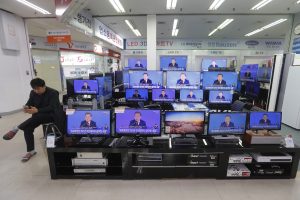South Korean President Moon Jae-in said Tuesday that he could seek exemptions of U.N. sanctions placed on North Korea to bring about improved inter-Korean relations that he believes would help restart nuclear negotiations between Pyongyang and Washington.
Moon has previously made similar comments, despite outside worries that any lifting of sanctions could undermine U.S.-led efforts to eliminate North Korea’s nuclear arsenal. His latest overture came about two weeks after North Korean leader Kim Jong Un threatened to bolster his nuclear deterrent in the face of what he called “gangster-like” U.S. pressure and sanctions.
Moon said at a New Year’s news conference Tuesday that greater inter-Korean cooperation would spur progress in stalemated nuclear diplomacy between North Korea and the United States and help gather international support for sanctions exemptions.
“If exceptions from U.N. sanctions are necessary for South-North cooperation, I think we can make efforts for that,” Moon said. “I think there is a heightened need for South and North Korea to dial up their cooperation a little bit and promote North Korean-U.S. talks, rather than just looking at North Korea-U.S. talks.”
Moon didn’t say what specific sanction exemptions he may need. He said last year that he would push for the exemption of U.N. sanctions to resume two major inter-Korean economic projects — a jointly run factory park and South Korean group tours to a scenic North Korean mountain. The projects served as a rare legitimate source of foreign currency for the North.
Moon acknowledged that efforts to boost inter-Korean ties would have limits because of the U.N. sanctions. But he said exchanges in sports and individual tours to North Korea are among the areas where the two Koreas can cooperate without violating the sanctions.
The prospect for Moon’s possible push to get sanctions exemptions is unclear. When South Korea’s foreign minister said in late 2018 that Seoul was considering lifting some unilateral sanctions on North Korea, President Donald Trump responded that South Korea “won’t do that without our approval.”
Inter-Korean relations have suffered big setbacks since the breakdown of Kim’s second summit with Trump in February 2019 in Vietnam. That summit collapsed because Trump rejected Kim’s demands for broad sanctions relief in return for dismantling his main nuclear complex, a limited disarmament step. Subsequent talks between Pyongyang and Washington reported little progress.
The development was a blow to Moon, a liberal who espouses greater reconciliation with North Korea. He shuttled between Kim and Trump in 2018, facilitating the early parts of U.S.-North Korean diplomacy such as the first Trump-Kim summit in Singapore in 2018.
Some experts say North Korea is angry with the South because it believes Moon’s push led it to waste time and make too many concessions in negotiations with the United States.
During a key ruling party meeting late last month, Kim expressed deep frustration over the deadlocked diplomacy and said he won’t denuclearize if the U.S. persists with its hostile policy toward his country. He also said he would unveil a new “strategic weapon” soon and no longer be bound by a weapons test moratorium that he placed at the start of his diplomacy with Trump.
Trump recently sent birthday greetings to Kim, who was believed to have turned 36 on January 8. Senior North Korean official Kim Kye Gwan said Saturday that the birthday messages won’t lead his country to return to talks unless the U.S. accepts its demands.
During Tuesday’s news conference, Moon said Trump’s birthday greetings were a “very good idea” that showed his resolve to continue diplomacy with North Korea. Moon noted that the North’s response suggested that it hasn’t still shut the door on dialogue.
By Hyung-Jin Kim for the Associated Press

































